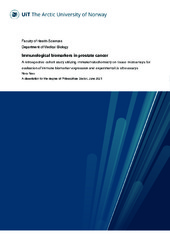| dc.contributor.advisor | Richardsen, Elin | |
| dc.contributor.author | Ness, Nora | |
| dc.date.accessioned | 2021-05-22T17:10:10Z | |
| dc.date.available | 2021-05-22T17:10:10Z | |
| dc.date.issued | 2021-06-11 | |
| dc.description.abstract | <p><i>Background:</i> Prostate cancer is a very common, but particularly heterogenic cancer form. Whilst some patients have a very aggressive course with a fatal outcome, the majority of patients have slow-growing disease with low risk of death or significant symptoms. Unfortunately, doctors do not possess sufficient prognostic tools, and there is a high risk of overtreatment with unnecessary side-effects. We set out to find new biomarkers for prognostic stratification of prostate cancer patients, and possibly at the same time generate hypotheses for potential therapeutic targets. We chose to analyze different immune system markers as the immune system is known to be a key player in cancer development.
<p><i>Material and methods:</i> Patient data and prostatectomy specimens from 535 Norwegian patients with primary prostate cancer was collected retrospectively. Tissue microarrays were constructed from tumor areas as well as non-malignant areas. Immunohistochemistry was used to evaluate amount of intratumoral CD3+, CD4+, CD8+, CD20+ and PD-L1+ lymphocytes as well as expression of PD-L1, CXCR6 and CXCL16 by both prostate cancer cells and tumor stromal cells. Further, we investigated the independent prognostic effect of each biomarker, as well as their correlation with each other and well-known clinical- and histopathological parameters.
<p><i>Main results:</i> A high amount/expression of CD8+ lymphocytes, PD-1+ lymphocytes, CXCR6 and CXCL16 independently predicted a worse prognosis. PD-L1 expression was commonly expressed by prostate cancer cells, and a high expression consistently correlated to worse prognosis, but results were not statistically significant.
<p><i>Conclusions:</i> Based on our observations, we propose further investigation of the biological mechanisms and prognostic effect of CD8, PD-1, PD-L1, CXCR6 and CXCL16 in prostate cancer. Hopefully one or more of these markers may improve risk stratification of PCa patients and may even be of value as targets of therapy in future PCa treatment. | en_US |
| dc.description.doctoraltype | ph.d. | en_US |
| dc.description.popularabstract | In Norway, prostate cancer is the most commonly diagnosed cancer, with almost 5000 new affected individuals every year. However, whilst some patients have a very aggressive course with a fatal outcome, the majority of patients have slow-growing disease with low risk of death or significant symptoms. Unfortunately, doctors do not possess sufficient prognostic tools to give each patient a satisfactory risk assessment, and thus, there is a high risk of overtreatment with unnecessary side-effects. In a quest to find new prognostic tools, we analyzed different immune system components, including components known to be important in cancer immunotherapy, in 535 surgically removed prostate cancers. Our discoveries indicate that a high amount of some immune system components in prostate cancer tumors may predict a more aggressive disease development. Further research is needed to verify if this information can be relevant for patients in either a prognostic- and/or treatment aspect. | en_US |
| dc.description.sponsorship | Norwegian Cancer Society, The Northern Norway Regional Health Authority, The Faculty of Health Sciences at UiT The Arctic University of Norway | en_US |
| dc.identifier.uri | https://hdl.handle.net/10037/21237 | |
| dc.language.iso | eng | en_US |
| dc.publisher | UiT The Arctic University of Norway | en_US |
| dc.publisher | UiT Norges arktiske universitet | en_US |
| dc.relation.haspart | <p>Paper I: Ness, N., Andersen, S., Valkov, A., Nordby, Y., Donnem, T., Al-Saad, S., … Richardsen, E. (2014). Infiltration of CD8+ lymphocytes is an independent prognostic factor of biochemical failure-free survival in prostate cancer. <i>The Prostate, 74</i>(14), 1452-1461. Also available at <a href=https://doi.org/10.1002/pros.22862>https://doi.org/10.1002/pros.22862</a>.
<p>Paper II: Ness, N., Andersen, S., Khanehkenari, M.R., Nordbakken, C.V., Valkov, A., Paulsen, E.E., … Richardsen, E. (2017). The prognostic role of immune checkpoint markers Programmed cell death protein 1 (PD-1) and Programmed death ligand 1 (PD-L1) in a large, multicenter prostate cancer cohort. <i>Oncotarget, 8</i>(16), 26789-26801. Also available in Munin at <a href=https://hdl.handle.net/10037/11397>https://hdl.handle.net/10037/11397</a>.
<p>Paper III: Richardsen, E., Ness, N., Melbø-Jørgensen, C., Johannesen, C., Grindstad, T., Nordbakken, C., … Bremnes, R.M. (2015). The prognostic significance of CXCL16 and its receptor C-X-C Chemokine Receptor 6 in prostate cancer. <i>American Journal of Pathology, 185</i>(10), 2722-2730. Also available at <a href= http://dx.doi.org/10.1016/j.ajpath.2015.06.013> http://dx.doi.org/10.1016/j.ajpath.2015.06.013</a>. | en_US |
| dc.relation.isbasedon | Andersen S, Richardsen E, Nordby Y, Ness N, Størkersen O, Al-Shibli K, et al. Disease-specific outcomes of Radical Prostatectomies in Northern Norway; A case for the impact of perineural infiltration and postoperative PSA-doubling time. BMC Urol. 2014. June 14;14:49. Available at <a href=http://hdl.handle.net/11250/284112>http://hdl.handle.net/11250/284112</a>. | en_US |
| dc.rights.accessRights | openAccess | en_US |
| dc.rights.holder | Copyright 2021 The Author(s) | |
| dc.rights.uri | https://creativecommons.org/licenses/by-nc-sa/4.0 | en_US |
| dc.rights | Attribution-NonCommercial-ShareAlike 4.0 International (CC BY-NC-SA 4.0) | en_US |
| dc.subject | VDP::Medisinske Fag: 700::Klinisk medisinske fag: 750::Onkologi: 762 | en_US |
| dc.subject | VDP::Medical disciplines: 700::Clinical medical disciplines: 750::Oncology: 762 | en_US |
| dc.title | Immunological biomarkers in prostate cancer - A retrospective cohort study utilizing immunohistochemistry on tissue microarrays for
evaluation of immune biomarker expression and experimental in vitro assays | en_US |
| dc.type | Doctoral thesis | en_US |
| dc.type | Doktorgradsavhandling | en_US |


 English
English norsk
norsk
